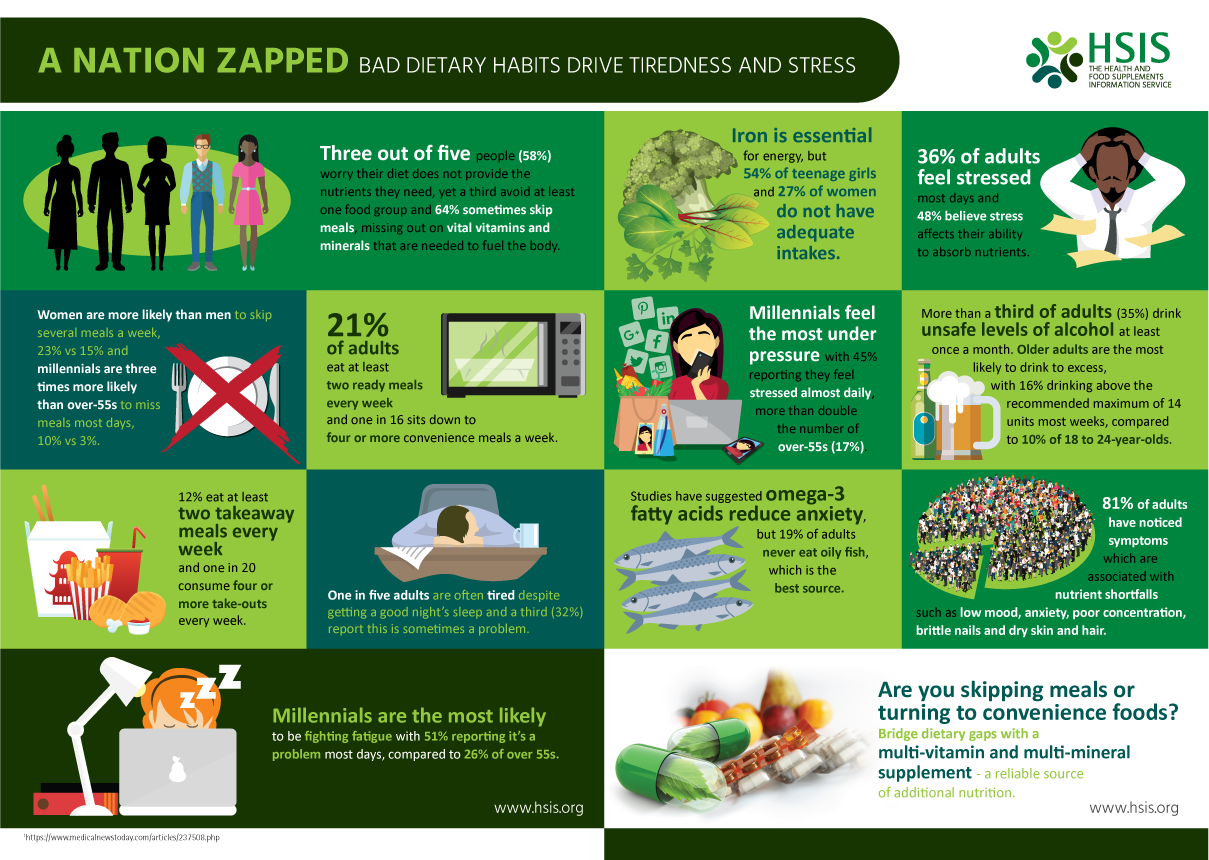
New research from the Health and Food Supplements Information Service (HSIS) reveals that three in 10 people worry that their diet might not be providing all the nutrients they need for their health and wellbeing. Yet 64% admit to skipping meals through the week. Missing meals means missing important vitamins and minerals that could be zapping the nation’s health and wellbeing, leaving people feeling stressed, run down and tired.
The HSIS survey of 1,000 adults from across the UK revealed that millennials are the worst offenders with 80% saying that they skip meals through the week. The related health issues do not go unnoticed, with 84% of people reporting they feel tired even though they have had a reasonable night’s sleep.
Millennials suffer the worst when it comes to sleep, with 92% saying they feel tired after a night in bed, while 1 in 8 over 55s report they never feel tired – and are the most dedicated to their food intakes with 48% saying they never skip a meal.
There also seems to be a vicious circle at work. While respondents say they are worried about the lack of nutrients in their diet and report feeling stressed, half (48%) said they think that stress levels impact the ability to absorb and use nutrients and 60% don’t take any form of food supplements, which would help bridge nutritional shortfalls they are experiencing.
Other common health ailments reported in the survey were low mood or stress, poor concentration, dry skin, brittle nails and constipation with women much more likely to report these than men. Ninety nine percent report having experienced stress, with a quarter (24%) saying they experience it every few days.
Dr Carrie Ruxton, adviser to the Health and Food Supplements Information Service said; “Having a balanced diet rich in vitamins, minerals and omega-3 fatty acids is the cornerstone of a healthy lifestyle, yet we still haven’t woken up to this important fact. Skipping meals here and there or cutting out whole food groups can mean that millions of us are missing out on vital vitamins and minerals, leaving them zapped of energy or experiencing stress, low mood, constipation, brittle nails and dry skin.
“However, sourcing optimal amounts of nutrients from the diet alone is a challenge and most people in the HSIS survey had not considered food supplements, which are an effective way to top up vitamin, mineral and omega-3 intakes”.
Many of the ailments mentioned by respondents are linked to diet. For example, zinc and selenium are important for normal nail health yet nearly one in ten adults doesn’t get enough zinc in the diet and almost half of women have inadequate intakes of selenium according to Government data[1].
Constipation is linked to low fibre intakes, while stress and low mood are typically seen in people with low intakes of oily fish, which contain omega-3 fatty acids.
Despite reporting these symptoms, the adults surveyed by HSIS did not seem to be taking the advice advocated by diet experts. Instead, 30% were avoiding at least one major food group, mainly carbohydrates, red meat or dairy. Despite the fact all of these foods are recommended in moderation within a balanced, nutritious diet.
Dr Ruxton adds: “Government advice clearly recommends fruit, vegetables, wholegrain carbohydrates, oily fish, lean meat and poultry, beans, pulses and moderate amounts of low-fat dairy foods. Yet, instead of following this advice, people are cutting out food groups, resorting to quick fix faddy diets or even skipping meals altogether.
“Nutrients should be obtained from eating a balanced diet. Where this is not possible, or where people need additional support to meet their nutritional needs, vitamin and mineral supplements provide a reliable source of nutrients.”
Other findings from the HSIS survey include;
- Fewer than one in five adults eat enough fruit and vegetables
- Nearly four in ten eat ready meals or takeaways at least once a week
- Most people (80%) are unaware that the Government recommends supplements for some groups and advises that everyone takes a vitamin D supplement for half of the year
- Four in 10 adults don’t take dietary advice from anyone, not even their doctor, while one in ten follows the advice of celebrities and social media bloggers. This doubles to one in five in the 18-24 age group.
[1] National Diet and Nutrition Survey (2018) 8% of adult women have inadequate zinc intakes while 47% of women have inadequate selenium intakes.
